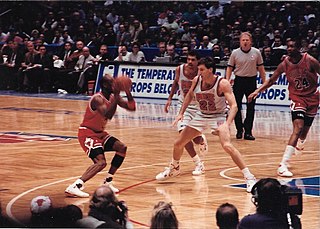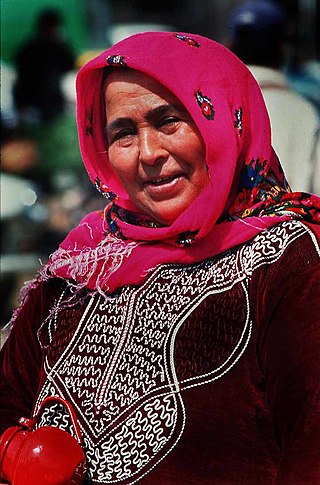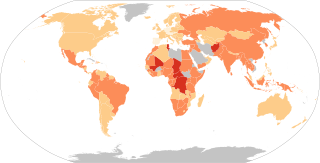Kristy Lavin is a player for England women's national basketball team. [1]
Kristy Lavin is a player for England women's national basketball team. [1]

Basketball is a team sport in which two teams, most commonly of five players each, opposing one another on a rectangular court, compete with the primary objective of shooting a basketball through the defender's hoop, while preventing the opposing team from shooting through their own hoop. A field goal is worth two points, unless made from behind the three-point line, when it is worth three. After a foul, timed play stops and the player fouled or designated to shoot a technical foul is given one, two or three one-point free throws. The team with the most points at the end of the game wins, but if regulation play expires with the score tied, an additional period of play (overtime) is mandated.

Association football, more commonly known as football or soccer, is a team sport played between two teams of 11 players each, who primarily use their feet to propel a ball around a rectangular field called a pitch. The objective of the game is to score more goals than the opposing team by moving the ball beyond the goal line into a rectangular-framed goal defended by the opposing team. Traditionally, the game has been played over two 45-minute halves, for a total match time of 90 minutes. With an estimated 250 million players active in over 200 countries and territories, it is the world's most popular sport.
Feminism is a range of socio-political movements and ideologies that aim to define and establish the political, economic, personal, and social equality of the sexes. Feminism holds the position that societies prioritize the male point of view and that women are treated unjustly in these societies. Efforts to change this include fighting against gender stereotypes and improving educational, professional, and interpersonal opportunities and outcomes for women.

Ice hockey is a team sport played on ice skates, usually on an ice skating rink with lines and markings specific to the sport. It belongs to a family of sports called hockey. In ice hockey, two opposing teams use ice hockey sticks to control, advance, and shoot a closed, vulcanized, rubber disc called a "puck" into the other team's goal. Each goal is worth one point. The team which scores the most goals is declared the winner. In a formal game, each team has six skaters on the ice at a time, barring any penalties, one of whom is the goaltender. Ice hockey is a full contact sport, and is considered to be one of the more physically demanding team sports.

A lesbian is a homosexual woman or girl. The word is also used for women in relation to their sexual identity or sexual behavior, regardless of sexual orientation, or as an adjective to characterize or associate nouns with female homosexuality or same-sex attraction. The concept of "lesbian" to differentiate women with a shared sexual orientation evolved in the 20th century. Throughout history, women have not had the same freedom or independence as men to pursue homosexual relationships, but neither have they met the same harsh punishment as gay men in some societies. Instead, lesbian relationships have often been regarded as harmless, unless a participant attempts to assert privileges traditionally enjoyed by men. As a result, little in history was documented to give an accurate description of how female homosexuality was expressed. When early sexologists in the late 19th century began to categorize and describe homosexual behavior, hampered by a lack of knowledge about homosexuality or women's sexuality, they distinguished lesbians as women who did not adhere to female gender roles. They classified them as mentally ill—a designation which has been reversed since the late 20th century in the global scientific community.

Misogyny is hatred of, contempt for, or prejudice against women or girls. It is a form of sexism that can keep women at a lower social status than men, thus maintaining the social roles of patriarchy. Misogyny has been widely practised for thousands of years. It is reflected in art, literature, human societal structure, historical events, mythology, philosophy, and religion worldwide.

A woman is an adult female human. Prior to adulthood, one is referred to as a girl.

Little Women is a coming-of-age novel written by American novelist Louisa May Alcott, originally published in two volumes in 1868 and 1869 at the request of her publisher. The story follows the lives of the four March sisters—Meg, Jo, Beth, and Amy—and details their passage from childhood to womanhood. Loosely based on the lives of the author and her three sisters, it is classified as an autobiographical or semi-autobiographical novel.

In modern usage, hijab generally refers to various head coverings conventionally worn by many Muslim women. While a hijab can come in many forms, it often specifically refers to a headscarf, wrapped around the head, covering the hair, neck and ears, but leaving the face visible. The use of the hijab has been on the rise worldwide since the 1970s and is viewed by many Muslims as expressing modesty and faith. There is a consensus among Islamic religious scholars that covering the head is either required or preferred, though some Muslim scholars and activists argue that it is not mandated. According to the Harvard University Pluralism Project: "Some Muslim women cover their head only during prayer in the mosque; other Muslim women wear the hijab; still others may cover their head with a turban or a loosely draped scarf."

Women's rights are the rights and entitlements claimed for women and girls worldwide. They formed the basis for the women's rights movement in the 19th century and the feminist movements during the 20th and 21st centuries. In some countries, these rights are institutionalized or supported by law, local custom, and behavior, whereas in others, they are ignored and suppressed. They differ from broader notions of human rights through claims of an inherent historical and traditional bias against the exercise of rights by women and girls, in favor of men and boys.
Women's suffrage is the right of women to vote in elections. In the beginning of the 18th century, some people sought to change voting laws to allow women to vote. Liberal political parties would go on to grant women the right to vote, increasing the number of those parties' potential constituencies. National and international organizations formed to coordinate efforts towards women voting, especially the International Woman Suffrage Alliance.

The FIFA Women's World Cup is an international association football competition contested by the senior women's national teams of the members of Fédération Internationale de Football Association (FIFA), the sport's international governing body. The competition has been held every four years and one year after the men's FIFA World Cup since 1991, when the inaugural tournament, then called the FIFA Women's World Championship, was held in China. Under the tournament's current format, national teams vie for 31 slots in a three-year qualification phase. The host nation's team is automatically entered as the 32nd slot. The tournament, called the World Cup Finals, is contested at venues within the host nation(s) over a period of about one month.
Gender equality, also known as sexual equality or equality of the sexes, is the state of equal ease of access to resources and opportunities regardless of gender, including economic participation and decision-making; and the state of valuing different behaviors, aspirations and needs equally, regardless of gender.

Pregnancy is the time during which one or more offspring develops (gestates) inside a woman's uterus (womb). A multiple pregnancy involves more than one offspring, such as with twins.

The ICC Women's Cricket World Cup is the sport's oldest world championship, with the first tournament held in England in 1973. Matches are played as One Day Internationals (ODIs) over 50 overs per team, while there is also another championship for Twenty20 International cricket, the ICC Women's T20 World Cup.

Rape is a type of sexual assault involving sexual intercourse or other forms of sexual penetration carried out against a person without their consent. The act may be carried out by physical force, coercion, abuse of authority, or against a person who is incapable of giving valid consent, such as one who is unconscious, incapacitated, has an intellectual disability, or is below the legal age of consent. The term rape is sometimes used interchangeably with the term sexual assault.

Domestic violence is violence or other abuse that occurs in a domestic setting, such as in a marriage or cohabitation. Domestic violence is often used as a synonym for intimate partner violence, which is committed by one of the people in an intimate relationship against the other person, and can take place in relationships or between former spouses or partners. In its broadest sense, domestic violence also involves violence against children, parents, or the elderly. It can assume multiple forms, including physical, verbal, emotional, economic, religious, reproductive, financial abuse, or sexual abuse. It can range from subtle, coercive forms to marital rape and other violent physical abuse, such as choking, beating, female genital mutilation, and acid throwing that may result in disfigurement or death, and includes the use of technology to harass, control, monitor, stalk or hack. Domestic murder includes stoning, bride burning, honor killing, and dowry death, which sometimes involves non-cohabitating family members. In 2015, the United Kingdom's Home Office widened the definition of domestic violence to include coercive control.
Patriarchy is a social system in which positions of dominance and privilege are primarily held by men. It is used, both as a technical anthropological term for families or clans controlled by the father or eldest male or group of males and in feminist theory where it is used to describe broad social structures in which men dominate over women and children. In these theories it is often extended to a variety of manifestations in which men have social privileges over others causing exploitation or oppression, such as through male dominance of moral authority and control of property.

The National Women's Soccer League (NWSL) is a professional women's soccer league at the top of the United States league system. Headquartered in New York City, it is owned by the teams and, until 2020, was under a management contract with the United States Soccer Federation.

The 2023 FIFA Women's World Cup was the ninth edition of the FIFA Women's World Cup, the quadrennial international women's football championship contested by women's national teams and organised by FIFA. The tournament, which took place from 20 July to 20 August 2023, was jointly hosted by Australia and New Zealand. It was the first FIFA Women's World Cup with more than one host nation, as well as the first World Cup to be held across multiple confederations, as Australia is in the Asian confederation, while New Zealand is in the Oceanian confederation. It was also the first Women's World Cup to be held in the Southern Hemisphere.